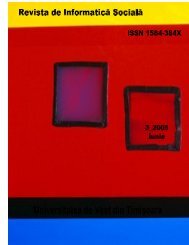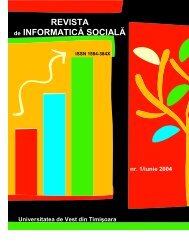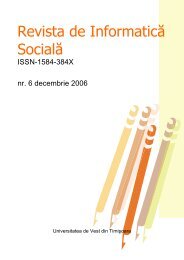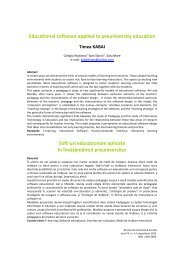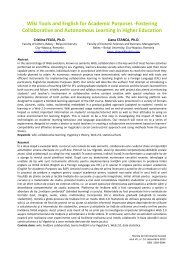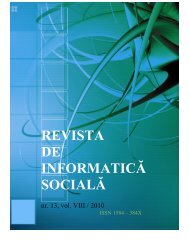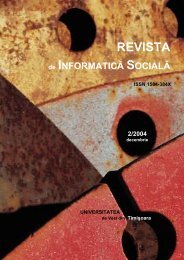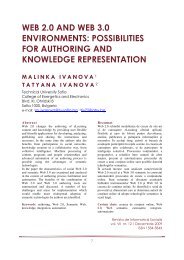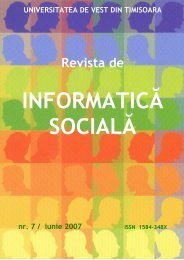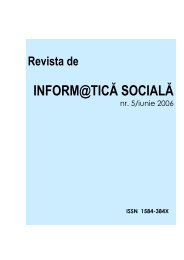- Traditional web use: searching the web to find information or for other general purposes,sending and receiving email;- Creating and using media: managing and modifying digital images, creating presentations,creating and editing audio and vi<strong>de</strong>o files;- Web 2.0 publishing: creating or commenting blogs, contributing to wikis, using socialnetwork sites;- Media sharing: downloading or sharing mp3 and podcasts, sharing content on the Internet,using social bookmarking;- Advanced mobile use: accessing the Internet with the mobile phones in or<strong>de</strong>r to access audioand vi<strong>de</strong>o files, search for information, send and receive email.Activities falling in the first category (traditional web use) are by far the most common, while otherkind <strong>of</strong> uses are still not so common; it would be an interesting topic for further research in thisfield to find ways to further refine the analysis, in particular by looking more in <strong>de</strong>pth into the broadcategory <strong>of</strong> “web 2.0 publishing”, that can put together many different type <strong>of</strong> behaviours andattitu<strong>de</strong>s (which is the relation, for example, between activities as different as updating a content onWikipedia or contributing to a blog on one si<strong>de</strong>, or pushing the “I like” button <strong>of</strong> Facebook on theother?).Finally, the enthusiasm towards the growing diffusion <strong>of</strong> new media and <strong>of</strong> the social web shouldnot lead us to forget that the acquisition <strong>of</strong> media literacy is a process that cannot be taken forgranted, or completely left to spontaneous initiatives. As Jenkins (2006a) clearly reminds us, thereare at least three main problems that still need to be addressed, and whose relevance should not beun<strong>de</strong>restimated:- the participation gap: this theme is not new, as issues linked in a way or another to the digitaldivi<strong>de</strong> have been among the most <strong>de</strong>bated problems since the early days <strong>of</strong> Internet. Thisproblem should not be addressed by looking only at the mere availability <strong>of</strong> a certaintechnology (even if significant gaps still are present at this regard); possibility <strong>of</strong> access mustalso be accompanied by the <strong>de</strong>velopment <strong>of</strong> appropriate skills in the use <strong>of</strong> new technologies.The inability to find information on the Internet could even become a factor <strong>of</strong> social exclusionin a near future (Castells, 2001).- the transparency problem: media content can influence the way in which we see reality, andcan therefore be vulnerable to manipulation by those who have an interest in promoting certainmessages or to impose certain attitu<strong>de</strong>s and behaviours (Castells, 2009); even if mediaconditioning is something that the culture <strong>of</strong> mo<strong>de</strong>rnity has long been accustomed to live with,it must be said that the network society, also because <strong>of</strong> its consi<strong>de</strong>rable complexity, presentscharacters <strong>of</strong> strong opacity. The ability to properly assess the information, discriminatingbetween reliable and unreliable sources, will increasingly represent a fundamental skill forcitizens all over the world; the present situation does not seem to encourage a particularoptimism regarding the growth <strong>of</strong> a wi<strong>de</strong>spread social awareness <strong>of</strong> this issue (see also theinteresting results reported in a recent research by Hargittai et al., 2010).- the ethics challenge: the open and participatory nature <strong>of</strong> the Internet tends to encourageindividuals to share a variety <strong>of</strong> information, without discriminating between data that can beshared without major concern and those “sensible data” that should be carefully protected fromintrusion by outsi<strong>de</strong>rs (Jenkins, 2006a). The <strong>de</strong>velopment <strong>of</strong> social networks has helped tosharpen the relevance <strong>of</strong> this problem, as these sites present the hybrid characteristic <strong>of</strong> creatinga sort <strong>of</strong> private spaces into a wi<strong>de</strong>r networked place (Boyd, 2008). The ten<strong>de</strong>ncy to blur thetraditional lines between public and private spaces, which already characterized electronicmedia (television in particular, cfr. Meyrowitz, 1985), is particularly relevant in the case <strong>of</strong>social networks. This means that people must learn new ways to renegotiate their practice <strong>of</strong>sharing personal information.
The available evi<strong>de</strong>nce seems to cast some doubts concerning the possibility that young generationsare naturally endowed with the skills to a<strong>de</strong>quately cope with similar issues. For this reason,educators face a complex and important task, given also that the <strong>de</strong>velopment <strong>of</strong> a criticalawareness concerning how to correctly use the tools that technology make available will become akey dimension to live, work and participate in the society <strong>of</strong> the future.References1. BECTA, (2008), Harnessing Technology: Schools Survey 2008, retrieved online:http://research.becta.org.uk/upload-dir/downloads/page_documents/research/ht_schools_survey 08_analysis.pdf.2. Boyd D., (2008), Taken Out <strong>of</strong> Context: American Teen <strong>Social</strong>ity in Networked Publics, Ph.Ddissertation, retrieved on line: http://www.danah.org/papers/.3. Bullen M., Morgan T., Belfer K. and Qayyum A., (2009), “The Net Generation In Higher Education:Rhetoric and Reality”, International <strong>Journal</strong> <strong>of</strong> Excellence in e-Learning, 2(1): 1-13.4. Carr N., (2008), The Big Switch: Rewiring the World, from Edison to Google, W.W.<strong>No</strong>rton & Company,New York.5. Castells M., (2009), Communication power, Oxford University Press, Oxford.6. Castells M., (2001), The Internet Galaxy: Reflections <strong>of</strong> the Internet, Business, and Society, OxfordUniversity Press, Oxford.7. CLEX (Committee <strong>of</strong> Inquiry into the Changing Learner Experience), (2009), Higher Education in aWeb 2.0 World. Report <strong>of</strong> an in<strong>de</strong>pen<strong>de</strong>nt Committee <strong>of</strong> Inquiry into the impact on higher education <strong>of</strong>stu<strong>de</strong>nts’ wi<strong>de</strong>spread use <strong>of</strong> Web 2.0 technologies, retrieved on line:http://www.jisc.ac.uk/media/documents /publications /heweb20rptv1.pdf.8. Eisenstein E., (1979), The Printing Press as an Agent <strong>of</strong> Change: Communications and CulturalTransformations in Early Mo<strong>de</strong>rn Europe, Cambridge University Press, Cambridge-New York.9. Hargittai E., (2010), “Digital Na(t)ives ? Variation in Internet Skills and Uses among Members <strong>of</strong> the‘‘Net Generation”, Sociological Inquiry, 80(1), 92-113.10. Hargittai E., Fullerton L., Menchen-Trevino E. e Thomas K.Y., (2010), “Trust Online: Young Adults’Evaluation <strong>of</strong> Web Content”, International <strong>Journal</strong> <strong>of</strong> Communication, 4, 468-494.11. Ipsos Mori, (2007), Stu<strong>de</strong>nt Expectations Study. Key findings from online research and discussionevenings held in June 2007 for the Joint Information Systems Committee. London: Joint InformationSystems Committee (JISC), retrieved on line:http://www.jisc.ac.uk/media/documents/publications/stu<strong>de</strong>ntexpectations.pdf.12. ISTAT, (2008), L’uso <strong>de</strong>i media e <strong>de</strong>l cellulare in Italia. Indagine multiscopo sulle famiglie “I cittadini eil tempo libero” – Anno 2006, retrieved on line: http://www.istat.it/dati/catalogo/20080429_00/.13. Ito M., Baumer S., Bittanti M., boyd d., Cody R., Herr B., Horst H.A., Lange P.G., Mahendran D.,Martinez K., Pascoe C.J., Perkel D., Robinson L., Sims C., and Tripp L., (2009), Hanging Out, MessingAround, Geeking Out: Living and Learning with New Media, MIT Press, Cambridge.<strong>14</strong>. Jenkins H., (2006a), “Confronting the Challenges <strong>of</strong> Participatory Culture: Media Education for the 21stCentury”, retrieved on line:http://digitallearning.macfound.org/site/c.enJLKQNlFiG/b.2029291/k.97E5/Occasional_Papers.htm.15. Jenkins H., (2006b), Convergence culture: where old and new media colli<strong>de</strong>, New York UniversityPress, New York.16. Jones C. and Cross S., (2009), “Is there a Net generation coming to university?” Paper presented at theAssociation for Learning Technology Conference 2009 “In dreams begins responsibility”: Choice,evi<strong>de</strong>nce and change, Manchester, UK, 8-10 September, retrieved on line:http://repository.alt.ac.uk/645/1/ALT-C_09_proceedings_090806_web_0299.pdf.17. Kennedy G. et al., (2009), Educating the net generation: A handbook <strong>of</strong> findings for practice and policy,Sydney: Australian Learning and Teaching Council, retrieved on line:http://www.netgen.unimelb.edu.au/outcomes/handbook.html.18. Kennedy G.E., Judd T.S., Churchward A., Gray K. and Krause K-L., (2008), “First year stu<strong>de</strong>nts’experiences with technology: Are they really digital natives?”, Australasian <strong>Journal</strong> <strong>of</strong> EducationalTechnology 24(1), 108-122.
- Page 1: Revista de Informatica Sociala 14 /
- Page 7: ● ● ●CONTENTS● ● ●[9-20
- Page 10 and 11: THE TRANSITION FROM OLD TO NEW MEDI
- Page 12 and 13: 30252023.420.325.11510500.85.5Never
- Page 14 and 15: Overall, we can therefore sum up on
- Page 16 and 17: n.a.I often use itI seldom use it6.
- Page 20 and 21: 19. Kvavik R.B., Caruso J.B. and Mo
- Page 22: IntroductionIn 1995, Bernie Dodge o
- Page 25 and 26: The Web-Inquiry Project [WIP] is a
- Page 27 and 28: and even orally. The teacher will a
- Page 29 and 30: environment in which the teacher gu
- Page 31 and 32: Transformation Through Online Learn
- Page 33 and 34: INTRODUCTIONLeading practitioners a
- Page 35 and 36: learning. We also describe how the
- Page 37 and 38: Some of these transformations are b
- Page 39 and 40: Recently, Twigg has received suppor
- Page 41 and 42: Stage III: Unbundled Learning, Mark
- Page 43 and 44: perhaps using Second Life-like virt
- Page 45 and 46: performance. Indeed, Stage V will l
- Page 47 and 48: Free-Range Open LearningOver time,
- Page 49 and 50: New communities, tools and services
- Page 51 and 52: Embed enterprise-wide predictive an
- Page 53 and 54: In collaboration with Strategic Ini
- Page 55 and 56: Wiki Tools and English for Academic
- Page 57 and 58: eality. Besides being an additional
- Page 59 and 60: StudentPage 1StudentPage nTeacher
- Page 61 and 62: 100%90%80%70%60%50%40%30%20%10%0%Ac
- Page 63 and 64: 200Correlation View/Page Edits150Vi
- Page 65 and 66: 14. http://eacea.ec.europa.eu/llp/s
- Page 67 and 68: Simularea şi comunicarea electroni
- Page 69 and 70:
RespondenţiRăspunsuriLa nivelul
- Page 71 and 72:
RespondenţiRăspunsuriLa nivelul
- Page 73 and 74:
Respondenţii au fost rugaţi să i
- Page 75 and 76:
Itemul 9 doreşte să identifice ti
- Page 77 and 78:
Identificara opţiunii, chiar şi p
- Page 79 and 80:
EşantioaneRăspunsuri/Ranguriagita
- Page 81 and 82:
modalităţile practice prin care u
- Page 83 and 84:
1. INTRODUCEREÎn prezent, complexi
- Page 85 and 86:
Figura 1. Analiza grafică a evolu
- Page 87 and 88:
Faţă de această situaţie se deg
- Page 89 and 90:
variabilele acesti noi culturi cybe
- Page 91 and 92:
INTRODUCEREÎncă din anul 2000 am
- Page 93 and 94:
după tipul lecţiei: prezentare de
- Page 95 and 96:
Funcţiile oferite de AEL asigură
- Page 97 and 98:
• elevi/studenţi, beneficiari di
- Page 99 and 100:
Se poate folosi cadrul formal de co
- Page 102 and 103:
Evaluarea formativă este comentari
- Page 104 and 105:
Rezultatele elevilor, pe itemi:Diag
- Page 106 and 107:
Nr. Denumirea activităţii AEL MOO
- Page 108 and 109:
SEMNAL EDITORIALLaura MALITA, Vanna
- Page 110:
IN MEMORIAMConstantin TraianCHEVERE



